Jallikattu
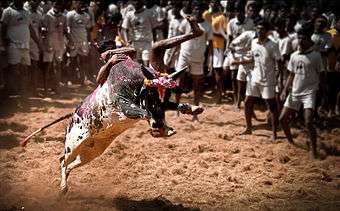
Jallikattu (Tamil: சல்லிகட்டு, challikaṭṭtu) also known as Eruthazhuvuthal (Tamil: ஏறுதழுவல், ērutazhuval) or Manju virattu (Tamil: மஞ்சு விரட்டு), is an event held in Tamil Nadu as a part of Pongal celebrations on Mattu Pongal day. Bulls are bred specifically by people of the village for the event and attended mainly by many villages' temple bulls (koil kaalai). A temple bull is like the head of all cattle in a village; special rituals will be performed for this temple bull during important days. During the event, prizes are announced to encourage the youth to participate. After the event, tamed weak bulls are used for domestic activities and agriculture, meanwhile the untamable strong bulls are used for breeding the cows. It is said to be ingenious where both sport and preservation of Ecosystem works well together.
Jallikattu has been known to be practised during the Tamil classical period.[1][2] It was common among the ancient people aayars who lived in the ‘Mullai’ geographical division of the ancient Tamil country.[3][4] Animal activists and PETA India have protested against the practice over the years.[5] Along with human injuries and fatalities, sometimes bulls themselves sustain injuries which people believe as bad omen for the village.
In May 2014, the Supreme Court of India banned the practice, citing animal welfare issues.[6] On 8 January, 2016, the Government of India passed an order exempting Jallikattu from all performances where bulls can not be used, effectively reversing the ban.[7] However, on 14 January, 2016, the Supreme Court of India upheld its ban on the event, leading to protests all over Tamil Nadu.[8]
Etymology
Jallikattu originated from the Tamil words Jalli and Kattu, referring to silver or gold coins tied to the bulls’ horns.[3]
History
Bull taming was common among the ancient people aayars who lived in the ‘Mullai’ geographical division of the ancient Tamil country.[3] Later, it became a platform for display of bravery and prize money was introduced for participation encouragement. A seal from the Indus Valley Civilization depicting the practice is preserved in the National Museum, New Delhi.[9] A cave painting in white kaolin discovered near Madurai depicting a lone man trying to control a bull is estimated to be about 1,500 years old.[10]
Variants
These include vaṭi viraṭṭu where a bull being released from an enclosure need to be held on to for a predetermined distance or time to win the prize, vēli viraṭṭu where a bull is released in an open ground with participants trying to subdue the animal and vaṭam manjuviraṭṭu where a bull is tied to a 50-foot-long rope (15 m) and a team of players attempt to subdue the bull within a specific time.[11]
Training and preparation
The calves that are reared to become bulls are fed a nutritious diet so that they develop into strong and sturdy animals. The calves, once they reach adolescence are taken to small events to familiarize them with the atmosphere and specific training is given based on the variant of the event it is meant for.[12] It is claimed that before the bulls are released, they are subjected to medical tests including tests for alcohol and substance that will aggravate the bulls. These tests are said to be conducted by a team of government vets under the supervision of the district collector. However, it has been argued that since Jallikattu was itself declared illegal, no test standards can be legally set. The human participants in the Jallikattu event are said to undergo medical tests and are tested for alcohol. For the people who raise these bulls, the animals are alleged to be sacred to them.
Protests and ban
Animal activists, the FIAPO (Federation of India Animal Protection Agencies)[13] and PETA India have protested against the practice over the years.[5] The Animal Welfare Board of India filed a case in the Supreme Court of India for an outright ban on Jallikattu because of the cruelty to animals and the threat to public safety involved. Protestors claims that Jallikattu is promoted as bull taming. Also it is claimed that Jallikattu exploits the bulls' natural nervousness as prey animals by deliberately placing them in a terrifying situation in which they are forced to run away from those they perceive as predators and the practice effectively involves catching a terrified animal.But protestors claim that a bull new to situations like Jallikattu involving a lot of strangers whom the bull considers to be potential threats(which they aren't) ,when it finds strength to get past the obstacles and find its way out is definitely considered to be a stronger and fit breed but instead the one's that succumb to the situation and stops trying is considered a weeker breed and they claim to send it for farming works.
On 27 November 2010, the Supreme Court permitted the Government of Tamil Nadu to allow Jallikattu for five months in a year and directed the District Collectors to make sure that the animals that participate in Jallikattu are registered to the Animal Welfare Board and in return the Board would send its representative to monitor over the event.[14] The Government of Tamil Nadu ordered that ₹2 lakh (US$3,000) be deposited by the organizers in case of an accident or injury during the event and enacted a rule to allow a team of veterinarians would be present at the venue for certifying the bulls for participation in the event and to provide treatment for bulls that get injured.[14]
The Ministry of Environment and Forests issued a notification in 2011 that banned the use of bulls as performing animals, thereby banning the event[15][16] But the practice continued to be held under Tamil Nadu Regulation of Jallikattu Act No 27 of 2009.[17] On 7 May 2014, the Supreme Court of India struck down the state law and banned Jallikattu altogether.[16] The Supreme Court noted that any flouting of the ban should result in penalties for cruelty to animals under The Prevention of Cruelty to Animals Act, 1960.[15][18] The court also asked the Government of India to amend the law on preventing cruelty to animals to bring bulls within its ambit. The Supreme Court also ruled that cruelty is inherent in these events, as bulls are not anatomically suited for such activities and making them participate is subjecting them to unnecessary pain and suffering, so such events were outlawed.[19][20]
On 8 January 2016, the Ministry of Environment and Forests permitted the continuation of the tradition under certain conditions, effectively ending the ban.[21][22] After hearing the petitions which were led by the Animal Welfare Board of India challenging central government's notification,[23] the Supreme Court of India on 12 January 2016 ordered a stay, issued notices to the central government and Tamil Nadu Government[24][25][26] and later refused to lift the stay.[27]
Jallikattu supporters requests the events to be held with regulations instead of banning the event altogether. Because the evidence submitted by the protesters in Supreme Court was taken prior to formation of Tamilnadu Regulation of Jallikattu Act.[17] Also the harmed animals are very less compared to the total bull participation and harming is against the rules of the game. [28] The supporters claim international conspiracy behind the ban citing the impact on natural farming and the interest of multi-national companies in dairy industry.[29][30] Jallikattu supporters also question the genuineness of PeTA as animal lovers.[31]
In popular culture
Jalikattu is often shown in Tamil cinema where the hero tames the bull to prove his gallantry.[32] Some of the popular movies include:
Gallery
-
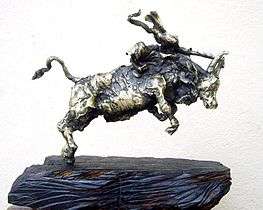
Artistic depiction of Jallikattu
-
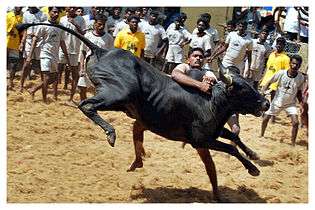
Jallikattu
-
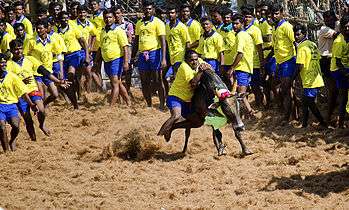
Jallikattu near Madurai
-
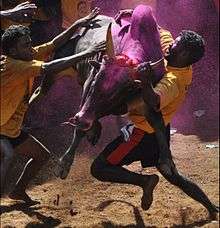
Bull taming in Tamil Nadu
See also
References
- ↑ François Gautier. A Western Journalist on India: The Ferengi's Columns.
- ↑ Grushkin, Daniel (22 March 2007). "Fearless Boys with Bulls in Avaniapuram". The New York Times. Retrieved 9 July 2008.
The ritual dates back as far as 2,000 years...
- 1 2 3 "Buzzing with bull talk". The Hindu. 8 January 2014. Retrieved 8 January 2014.
- ↑ "Who said bullfighting is cruel?". Firstpost. 12 January 2012.
- 1 2 "PETA founder held in India over bullfight protest". Reuters. Retrieved 8 January 2016.
- ↑ J.Venkatesan (8 May 2014). "Supreme Court bans Jallikattu in Tamil Nadu". The Hindu.
- ↑ "Centre allows Jalikattu". The Hindu. 8 January 2016.
- ↑ "Supreme Court refuses to vacate stay on Jallikattu order". The Hindu. 13 January 2016.
- ↑ T. Subramaniam (13 January 2008). "Bull-baiting of yore". The Hindu. Retrieved 2 March 2013.
- ↑ "Bull chasing, an ancient Tamil tradition". The Hindu. Retrieved 13 January 2013.
- ↑ "An ancient tradition sport". The Hindu. Retrieved 13 January 2013.
- ↑ "Jalikattu bull taming". Times of India. Retrieved 8 January 2016.
- ↑ "Save the bulls, support the ban". FIAPO. Retrieved 15 January 2016.
- 1 2 "1 killed in Jalikattu". sify.com. 16 January 2011.
- 1 2 "Animal Welfare Board of India vs. Nagaraja" (PDF). 7 May 2014.
- 1 2 "SC bans Jalikattu". PETA. Retrieved 8 January 2016.
- 1 2 "Tamilnadu Regulation of Jallikattu Act" (PDF). The Wire. 21 July 2009.
- ↑ "SC bans Jallikattu bull fights in-Tamil-Nadu". The Times of India. Retrieved 7 May 2014.
- ↑ "'Jallikattu is an abuse, not a sport': SC to hear pleas against Centre notification lifting ban on Jallikattu". First Post. 12 January 2016.
- ↑ "Jallikattu: Red Rag For the Law". The Citizen. 14 January 2016.
- ↑ "Centre lifts ban". The Indian Express. 8 January 2016.
- ↑ "Ministry of Environment and Forest allows use of bulls in Jallikattu in Tamilnadu". One Law Street. 7 January 2016.
- ↑ "SC to hear AWBI's petition challenging jallikattu order". The Hindu. 11 January 2016.
- ↑ "Supreme Court stays bull taming game Jallikattu; Jaya asks PM for an ordinance [Read Order]". One Law Street. 12 January 2016.
- ↑ "No Jallikattu in Tamil Nadu this year". The Hindu. 12 January 2016.
- ↑ "Jallikattu on hold: SC stays govt notification to allow bull taming". Hindustan Times. 12 January 2016.
- ↑ "Supreme Court refuses to vacate stay on jallikattu order". The Hindu. 13 January 2016.
- ↑ "Rules of the Game | Jallikattu". jallikattu.in. Retrieved 2016-09-24.
- ↑ "Banning Jallikattu will decimate India's indigenous cattle breeds". The Wire. 13 January 2016.
- ↑ "Coca cola in Dairy products". Dairy Reporter.
- ↑ "PeTA kills 90% of sheltered animals". Youtube. RT America. 21 March 2013.
- 1 2 3 4 "Rajni, Kamal did it". behindwoods.com. Retrieved 8 January 2016.
- ↑ "Mirugam movie". behindwoods.com. Retrieved 8 January 2016.
| Wikimedia Commons has media related to Jallikattu. |